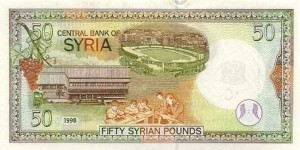 Syria has taken steps aimed at supporting the local currency and attracting capital, its central bank governor said, as it tries to contain the economic impact of protests against President Bashar al-Assad.
Syria has taken steps aimed at supporting the local currency and attracting capital, its central bank governor said, as it tries to contain the economic impact of protests against President Bashar al-Assad.
Adeeb Mayaleh said that the central bank has halved banks’ reserve requirements from 10 to 5 percent with possible cuts to zero percent if some of the banks’ assets were directed to support investment and tourist projects.
“This is to reduce the burden on the banks… In this way the bank is free to use its assets,” Mayaleh said in an interview with al-Thawra newspaper published on Wednesday.
He said that the central bank raised interest rates on deposits by two percentage points, adding that interest rates on certificates of deposit were also raised.
A leading regional banker said on Tuesday unrest in Syria had prompted the conversion of up to seven or eight percent of local currency into dollars.
“These measures aim to support liquidity in the banking sector, encourage savings and increase confidence of citizens in the Syrian pound,” Mayaleh was quoted as saying.
“By doing this the Syrian market offers a tempting opportunity for capital to enter the market.”
Syria raised the CDs interest rates to 10 percent for 1 year, 10.5 percent for 2-year and 11 percent for 3-year.
Pro-democracy protests have swept the country in the past six weeks and sometimes turned violent, claiming the lives of more than 500 people so far. Syrian authorities have arrested thousands of people.
Syria has slowly opened up its economy after decades of socialist practices, ending its monopoly on the banking sector eight years ago when privately owned commercial banks opened.
Mayaleh said the central bank has also raised the savings ceiling for individual depositors to 2 million pounds from 1 million pounds, which bankers said is aimed at encouraging savings in local currency.
“They want to maintain the Syrian pound (strength). Some people have withdrawn their (deposits) in Syrian pound and turned it to dollars,” a banker said.
“This is a dose of confidence. They want to stimulate the economy. This is to address aspirations of people who were worried about savings in pounds. The rates are higher than neighboring countries.”
Total assets in Syria’s banking sector amount to 2 trillion Syrian pounds ($43 billion), a small sum compared with neighboring economies. Syrian state-owned banks hold around three-quarters of the assets.
Flight of foreign currency
Syria on Wednesday also launched a string of measures to curb the flight of foreign currency by permitting for the first time savings in dollars and euros.
The measures come after Syria’s economic prospects weakened, with the International Monetary Fund revising downward its growth rate, the local currency diving about 10 percent in the black market and the Damascus Stock Exchange plunging 20 percent in the past six weeks.
“From today, Syrians are permitted to open savings accounts in dollars and euros worth up to $120,000 as long as the amount is blocked for at least six months,” a director at the central bank told AFP.
Reuters, AFP

Leave a Reply
You must be logged in to post a comment.